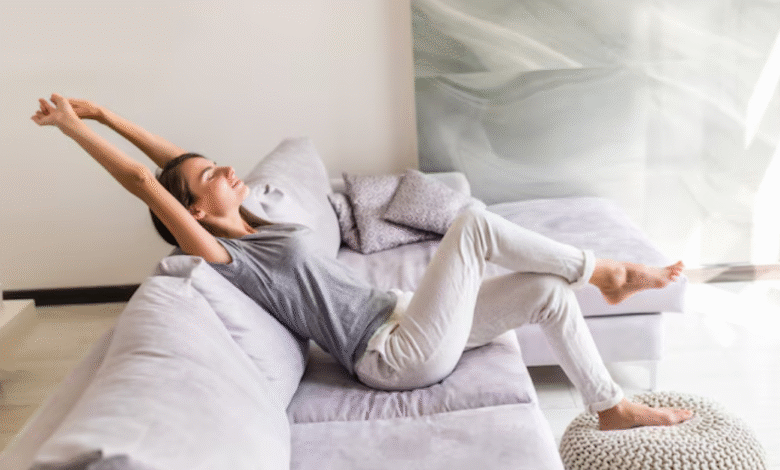How an Air Purifier Can Help You Sleep Better and Feel Refreshed

Getting a good night’s sleep is one of the most important things for our health. But sometimes, even if you go to bed early, you still wake up feeling tired. If that sounds familiar, the air in your bedroom might be part of the problem. Dust, pollen, smoke, and even pet dander can disturb your rest without you realising it. That’s where an air purifier can make a big difference.
What is an Air Purifier?
An air purifier is a simple device that cleans the air in your room. It pulls in the air around it, removes harmful particles, and releases cleaner air back into the room. Many air purifiers use filters like HEPA filters to catch dust, pollen, smoke, and even germs. Some also remove bad smells or harmful gases.
Why the Air in Your Bedroom Matters
You might not see it, but the air in your bedroom could be filled with things that affect your sleep. Common problems include:
- Dust mites from your bedding and carpets
- Pet dander if your pets sleep with you
- Mould spores, especially in damp areas
- Pollen that comes in through open windows
- Smoke or pollution from outside
Breathing in these particles during the night can cause coughing, sneezing, or even itchy skin. You may not fully wake up, but your body stays alert, and your sleep quality drops.
How an Air Purifier Helps You Sleep Better
1. Removes Allergens from the Air
If you have allergies, you already know how tough it can be to sleep with a blocked nose or itchy eyes. An air purifier helps by removing the allergens from the air before they reach your body. This means fewer allergy symptoms and a better chance of sleeping peacefully through the night.
2. Clears Out Dust and Mould
Dust and mould are two things that can silently disturb your breathing while you sleep. Air purifiers with strong filters can trap these particles, making your room cleaner and safer to sleep in.
3. Reduces Night-Time Coughing and Sneezing
Even if you don’t have allergies, poor air can still affect your breathing. If you often cough, sneeze, or wake up with a dry throat, an air purifier might help. Cleaner air means your body can relax, leading to deeper, more restful sleep.
4. Helps with Asthma and Other Breathing Problems
People with asthma or other breathing problems often struggle more at night. The airways naturally become tighter when we sleep, and dirty air makes things worse. Air purifiers help by removing triggers like dust, smoke, or chemicals from the air, allowing for easier breathing and better rest.
Improves Sleep Quality for Everyone
Even if you don’t suffer from allergies or asthma, clean air can still improve your sleep. Most of us don’t realise how much poor air quality can affect our rest. Once you start using an air purifier, you might notice you fall asleep quicker, wake up less during the night, and feel more energised in the morning.
Cuts Down on Noise and Helps You Relax
Some people think air purifiers are noisy, but many are actually very quiet. In fact, the soft hum of a quiet purifier can be relaxing. It acts like white noise, covering up other small sounds that might otherwise wake you up—like a neighbour’s dog or distant traffic.
Keeps Your Bedroom Smelling Fresh
Bad smells can also make it harder to sleep. Whether it’s cooking smells, cigarette smoke, or musty odours, they can affect your comfort. Many air purifiers remove these smells by filtering out the particles that cause them. You’re left with cleaner, fresher air that helps you relax.
Supports a Healthy Morning Routine
Waking up feeling tired can throw off your whole day. You might skip breakfast, feel cranky, or struggle at work or school. But sleeping in a cleaner environment can change that. With an air purifier improving the air in your room, you’re more likely to wake up refreshed and ready to go.
Choosing the Right Air Purifier for Better Sleep
Not all air purifiers are the same. Here are a few tips to help you choose one for your bedroom:
- Look for a HEPA filter: These are very good at catching tiny harmful particles.
- Choose a quiet model: You don’t want a loud machine keeping you awake.
- Check the size: Make sure it’s powerful enough for the size of your room.
- Avoid ozone generators: Some purifiers create ozone, which can be harmful to your lungs.
Best Time to Use Your Air Purifier
For the best results, it’s a good idea to run your air purifier at least a few hours before bedtime. You can also let it run all night on a low setting. This way, your bedroom air stays clean while you sleep.
How Fast Will You Notice a Change?
Some people feel the difference in just a few nights. Others may take a bit longer. If your sleep has been poor for a while due to bad air, using an air purifier won’t be a magic fix overnight—but it will help improve things over time.
Air Purifiers for Families and Children
If you have children or older people in the house, clean air is even more important. Kids and the elderly are more sensitive to polluted air. A good air purifier in their bedroom can help them breathe better and sleep more soundly.
What Else Can You Do for Cleaner Air?
While an air purifier is a great help, there are other small changes you can make too:
- Open windows during the day if the outside air is clean
- Wash your bedding often to reduce dust mites
- Vacuum regularly with a filter vacuum
- Avoid strong chemical sprays in the bedroom
Final Thoughts
An Air Purifier can truly change the way you sleep. From helping with allergies to reducing smells and noise, it creates a better space for rest. Whether you live in a busy city or a dusty area, investing in Air Purifiers could be the secret to better sleep and brighter mornings. It’s a simple step that makes a big difference in your daily life.




